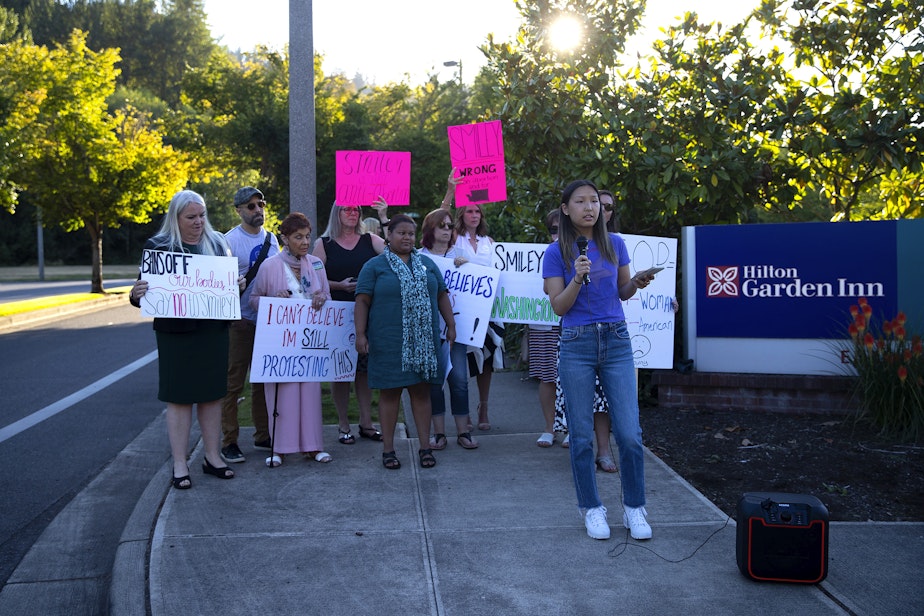WA GOP downplays abortion as campaign issue while Democrats protest
On Washington state’s Primary Day this week, Democratic candidates and their supporters made clear they will highlight the issue of abortion rights in the general election. They said in the wake of the U.S. Supreme Court decision overturning Roe v. Wade, Republican candidates for Congress will vote to restrict abortion rights if they’re elected.
Republican candidates, meanwhile, made no mention of abortion Tuesday as initial results were posted. They called Democrats’ concerns misplaced and said they’ll be more focused on issues like inflation and public safety heading into the general election.
Speaking from Washington, D.C. Tuesday, Democratic Sen. Patty Murray said she’s introduced legislation called the “Let Doctors Provide Reproductive Healthcare Act,” meant to protect doctors like the one in Indiana who provided an abortion to a 10-year-old victim of rape.
“No doctor should ever be punished for caring for patients and providing legal abortion care, but that’s exactly what extreme Republicans are doing across the country,” Murray said.
Murray said Rep. Kim Schrier, the Democrat from Washington’s 8th Congressional District, is joining her to help pass this bill in the House. Indiana’s attorney general has called for an investigation of Dr. Caitlin Bernard, and Sen. Murray said Wednesday that Sen. Mike Braun, a Republican from Indiana, had blocked her legislative proposal.

King County Democrats condemned what they said are Republican threats to abortion rights in a protest outside the Washington Republicans’ primary night watch party, at a hotel in Issaquah. The Democrats said Murray’s opponent, Republican Tiffany Smiley, will support further restrictions on abortion of she’s elected. Smiley has called herself "pro-life" and "pro-woman."
Sponsored
Jean Yu is a high school student in Bellevue.
“The future is absolutely terrifying for me,” she said. “So we are asking that you stand up for reproductive health-care access and to vote pro-choice and for Senator Murray.”
Nurse anesthetist Ashley Fedan said she has cared for women seeking abortions, and she wanted to send a message to the Republican gathering.
“God’s work is not scaring women and intimidating women to follow their values,” she said. “God’s work is holding the woman’s hand as she is falling asleep, scared, nervous, after encountering a lot of trauma.”
For their part, Republican candidates and speakers didn’t mention the issue of abortion from the podium on primary night. Washington Republican Party Chair Caleb Heimlich said the state has guaranteed legal abortion for decades, and GOP candidates will be focused on voters’ top concerns like inflation and public safety.
Sponsored
Murray’s challenger Tiffany Smiley had just under 32 percent of the vote in initial results. In her remarks, Smiley said she will be focused on addressing government spending, inflation, “energy independence,” and issues like education and illegal drugs.
“We can make sure that our children have a fighting shot in the educational system, that they have competitive quality education with a partnership with parents,” Smiley said. “We can ensure that we secure our border and stop the flow of fentanyl from coming into Washington state and killing our kids.”
According to the Seattle Times, Smiley has said if elected, she would neither vote to legalize nor to ban abortion nationwide. Reagan Dunn, who was running behind fellow Republican Matt Larkin to challenge Schrier in the 8th on primary night, has also said he would not vote to ban abortion nationwide.
But even if Republican candidates didn’t touch on abortion laws in their remarks, people at the GOP event said the issue is still central to them.
“The lives of people from conception to natural death are important to many Republicans, most Republicans,” said Beth Daranciang, vice chair for King County Republicans.
Sponsored
Daranciang was part of a group of women from the Republican gathering who went to speak to the Democrats rallying outside.
She and others at the GOP event said Washington state’s laws guaranteeing abortion are settled and no one expects them to change.
But she said she would support restrictions on abortion coverage. She opposes the state law that requires religious institutions to offer health insurance coverage of abortion.
“That’s radical beyond what most people think is reasonable, even if they are pro-choice,” Daranciang said.
Washington state passed the Reproductive Parity Act in 2018. It requires all employers covered by state law to pay for abortions if they also cover maternity care.




